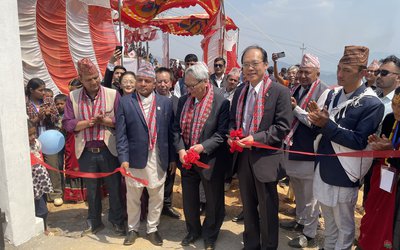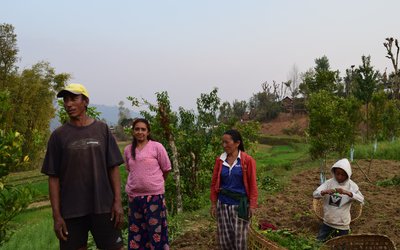Earthquake issues have suddenly come in sharp focus now with pictures in our living room of the recent strong earthquake in Christchurch, New Zealand and more recently in the north east coast of Japan. In Christchurch 100, 000 houses were damaged or destroyed. 60 to 80 % of the central business district including many historic and iconic buildings were ruined. But thank God they did not have a sunami like the Japanese did. Both in New Zealand and Japan strict building codes were followed when the buildings that are now razed to the ground were originally built. With dubiously built high rise buildings going up at a rapid clip in Nepal, I shudder to think how these structures will withstand an earthquake of the magnitude that New Zealand or Japan recently experienced. Live and learn, they say. Unfortunately we may not live to learn.
One thing is for certain, it will be impossible to treat everyone who needs medical care after a severe earthquake in Nepal. Wherever there are functioning hospitals ( many hospitals and nursing homes may be reduced to rubble ), a triage team will need to be set up to determine how urgently the patient needs to be admitted to the hospital. The second question will be, are there adequate resources in the hospital to meet the need? For example crush injury of muscles ( rhabdomyolysis) will be one of the commonest medical problem encountered after an earthquake as was the case in Haiti last year. Rhabdomyolysis leads to acute renal failure because the muscle protein is harmful to the kidneys. Depending on how promptly fluid therapy is started, dialysis ( artificial kidney ) may be necessary for the patient. Unfortunately dialysis is not commonly available in Nepal; so even though the patient may be alive, lack of needed equipment and expertise will conspire to work against the patient.
Many patients will arrive to the hospital with open infected wounds and fractures. Besides dealing with proper wound care and fracture repair, the patients will need appropriate antibiotics to fight sepsis which is common after this kind of a traumatic injury. In Haiti those who were rescued late and arrived to the hospital had maggots ( fleas) in their wounds. Health care professionals not used to dealing with new and unusual problems will have to consult others, improvise and learn on the job. Another common problem will be crush injury leading to gangrene of the limbs which will need amputation to avoid the spread of gangrene. Amputation will be one of the commonest surgeries that will be carried out post earthquake as was also seen in Haiti.
Indeed the list of post earthquake medical problems can be a mile long. So, increasing awareness about earthquake preparedness is obviously very useful. Getting under a desk without running downstairs while the building is shaking will require willpower, but duck and seek cover is still the prevalent wisdom of the day. If outside, getting away from buildings and power lines is recommended, but this may be hard to do in the middle of Indra Chowk.
- TANAHU HYDROPOWER PROEJCT: A Significant Achievement
- Apr 15, 2024
- AMBASSADOR HANAN GODAR: Sharing Pain With A Nepali Family
- Mar 30, 2024
- VISIT OF KfW AND EIB TO NEPAL : Mission Matters
- Mar 25, 2024
- NEPAL BRITAIN SOCIETY: Pratima Pande's Leadership
- Mar 24, 2024
- NEPAL ARMY DAY: Time To Recall Glory
- Mar 15, 2024
















